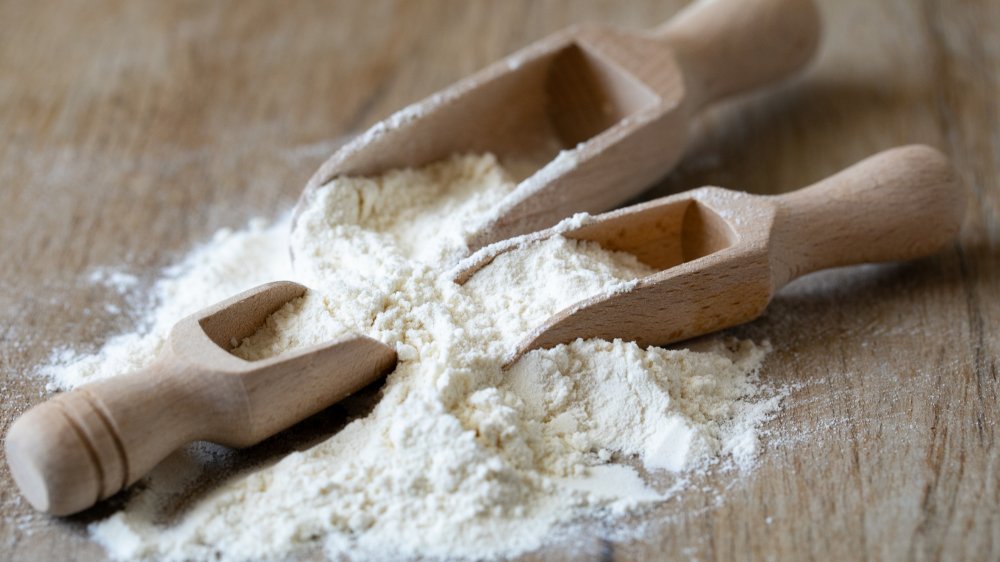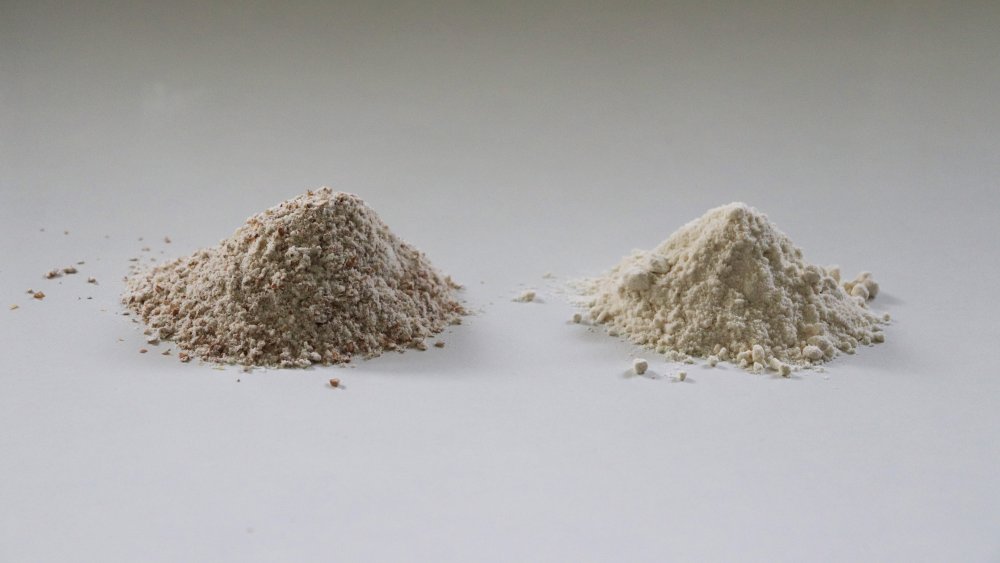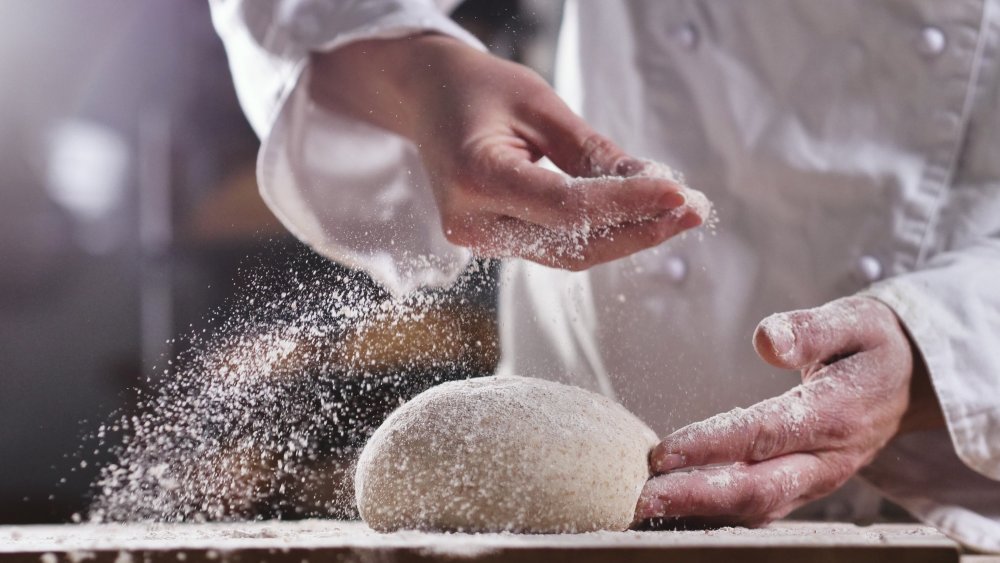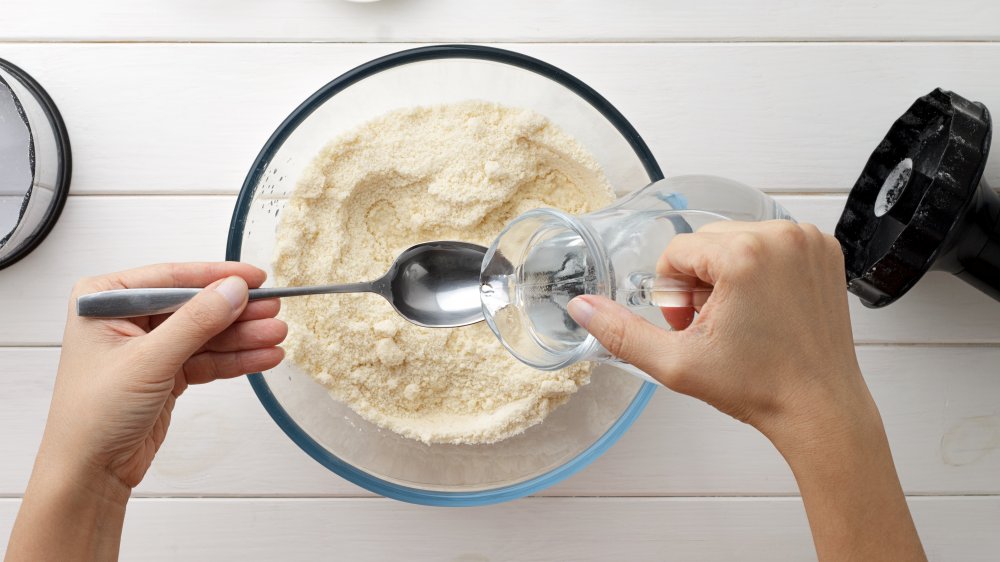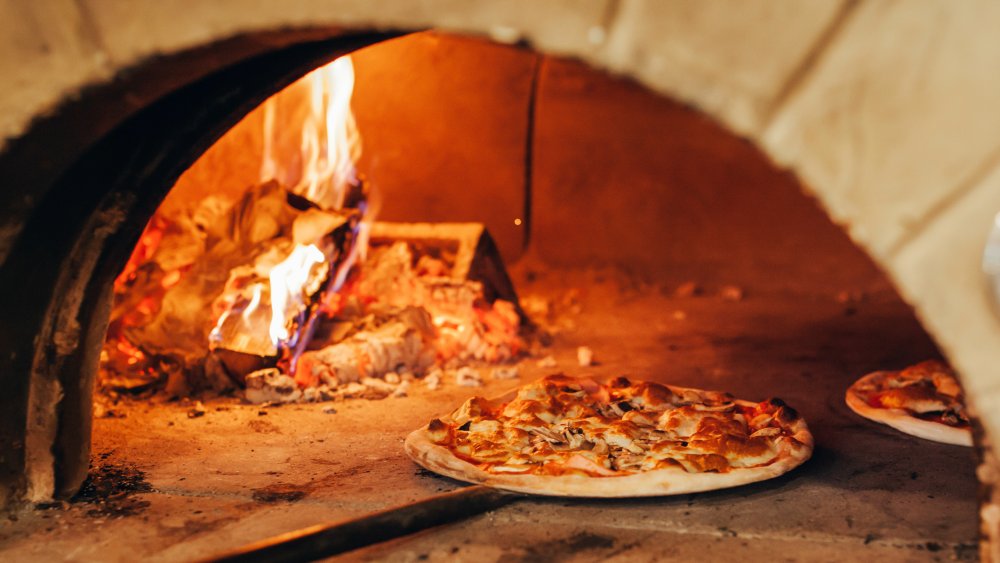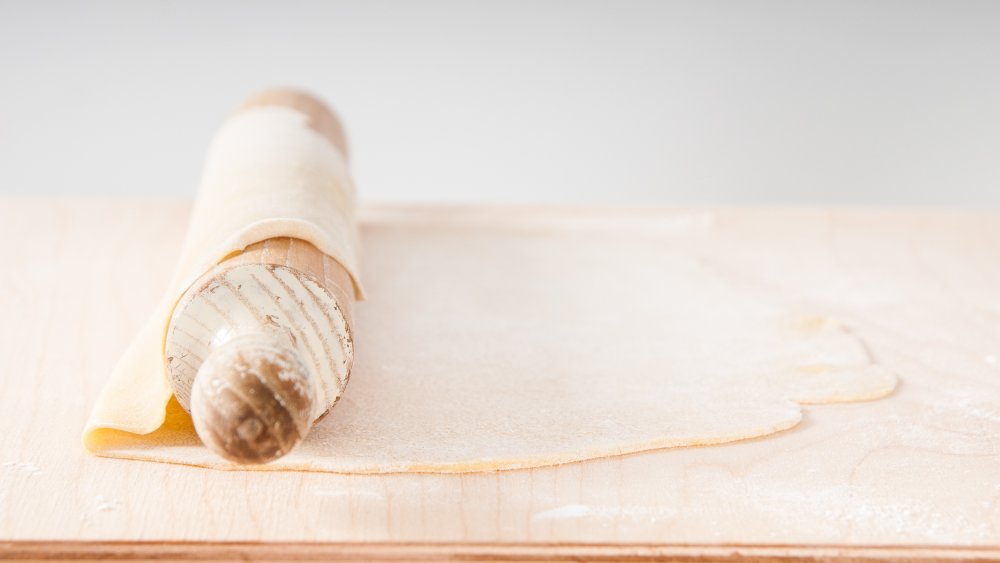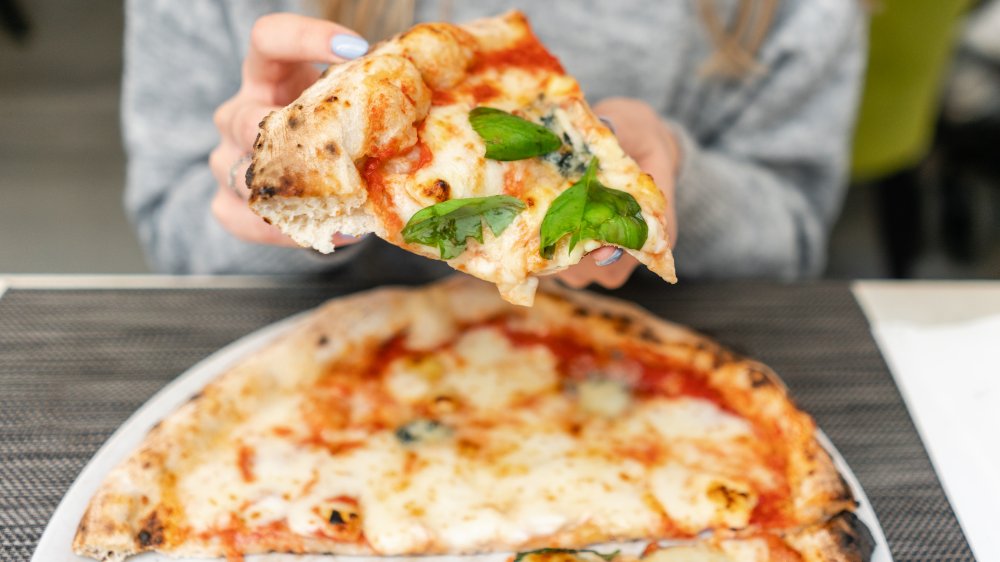What Is 00 Flour And How Is It Different Than Bread Flour?
It's said over and over again, but it's true: baking is a science. It's sort of like kitchen chemistry, and it's the reason your baking projects come out really good... or phenomenally bad.
Getting things right in the kitchen starts with your ingredients, and even that can be incredibly intimidating. Just look at how many different types of flour are on the grocery store shelves! Not only do you have to choose between things like white, wheat, and rye, but then there's bread flour, and what is this 00 flour? Why do some recipes specifically call for it? Is it absolutely necessary? What if you can't find it at your favorite grocery store?
Let's clear up some of the questions about this very specific type of flour, figure out when you should use it, when you should definitely not use it, and whether or not it's worth keeping this flour in your pantry.
So, what makes flour 00?
Right, so let's start with the basics: what is it, and what's it good for?
00 flour is the gold standard for Italian cooking, especially thin-crust pizzas and homemade pasta. It all has to do with texture. According to Serious Eats, the 00 designation is a reference to how finely the flour is milled, and this is the finest stuff you can get. Imagine taking a handful of your standard flour (pictured, on the left), and putting it alongside a pile of baby powder. You can tell the difference, right? 00 flour (pictured, on the right) is ground to about the same fineness as that baby powder.
If you're thinking that's kind of strange, you're right — it's a European thing. The Kitchn notes that while American flours are classified by protein content (and, in turn, gluten content), European flours are classified by the fineness of the grind. Assuming 00 refers to protein content is a mistake. Different types of 00 flour can vary in protein, but most 00 flour that finds it to American shelves has a protein content similar to what you can expect to work with in all-purpose flour.
Caputo is the gold standard, and yes, of course there's different kinds
If you want to experience authentic pizza, there's no doubts about where you should look. Italy has, for generations, taken serious pride in their cuisine, and it shows. The best pizza starts with the best flour, and that's Caputo. Around 80 percent of pizzerias in Naples use Caputo flour, and really? What more do you need to know?
Caputo has a few different types of flour, and here's where we have to add a bit of a disclaimer: some argue that it's not entirely clear what the difference between all the bags is. Those over at the Brick Oven Baker say differences are subtle, and the manufacturer is tight-lipped when it comes to sharing just what's in the bags. But according to Vorrei, there's some general guidelines.
First, they say there's the Blue 00 flour. That's the roughest of their 00 line, and if you're looking to make a pizza that's got a crust that's thin-ish in the middle and thick around the edges, this is your flour. It's a good sort of all-purpose pizza flour, so you can't go wrong.
The Red 00 flour is what you're going to want to reach for if you're opting for thinner crust pizzas, though. It's really that easy!
Looking to make a special, authentic Italian dinner for someone? Start with the Caputo in the brown bag, which is perfect for making things like gnocchi and ravioli.
It's all about the gluten content with 00 flour
Right, so you know that 00 is great for pizza dough, but why?
It's all about the gluten formation, because it's gluten that determines how chewy your crust is going to be. We've all been there: you're looking forward to pizza night all day, only to find you're completely incapable of chewing your way through the crust without dislocating your jaw. Ugh.
Here's what's going on. According to The Spruce Eats, many people will opt for bread flour when they're making pizza dough. (All-purpose is another option, but that's going to make a dough that tears easily... so you might just want to skip that.) Bread flour is high in gluten, and while your final product will be crispy on the outside, the gluten also means it's going to be springy. When you stretch it, it's going to want to spring back — and that's annoying. Bread flour, says SFGate, is considered a high gluten flour, with a gluten content of up to 13 or 14 percent.
Caputo 00 flour is a little lower, coming in at around 12 percent gluten. That's pretty much perfect and will give you a chewy crust without crossing the line and getting rubbery. Plus, the dough will form those oh-so-delicious puffs and bubbles as it bakes. Win!
You'll have to adjust the water content with 00 flour
If you're going to try to use your favorite pizza dough recipe but swap in 00 flour, doing a straightforward substitution is going to cause some problems.
Pizza & Other Bread says that no matter what flour you're using, hydration level is important. If you use too little water, you'll end up with a dry, dense crust. Too much water, and you're going to have a sticky dough that's impossible to work with, and won't hold its shape. Most standard recipes take this into account, but if your favorite calls for, say, bread flour and you decide to swap in 00, you're going to have to make some adjustments.
Hydration level is measured by ratios, so say you have 100 grams of flour, and add 65 grams of water. That's going to give you a 65 percent hydration level, and that's pretty standard for pizza dough. But, Serious Eats says that since 00 flour is so fine, your standard amount of water is going to make your dough way too runny to work with. Your best bet is to find a recipe that specifically calls for 00 flour, and if you want to use it as a substitution, it's going to take a lot of trial and error — and slowly adding water — in order to get your proportions right.
You're going to need a super-hot oven for pizza dough made with 00 flour
There are lots of ways to mess up pizza and getting your pizza crust to come out right is surprisingly complicated. It's entirely possible that based on the equipment you have at your disposal, you might want to forget about using 00 flour at all.
Why? Because even though it might be the only authentic choice for a true, Neapolitan-style pizza, there's a massive catch. In order to get it really, really right, you're going to need a super-hot oven.
Jeff Varasano of Varasano's Pizzeria says (via PMQ) that in his experience, 00 flour works best in an oven that's cooking very fast and very hot: like, 800 degrees Fahrenheit and above sort of hot. At cooler temperatures, you're not going to get that distinctive browning you want, and the texture might just end up a little "eh." If he's cooking his pizzas at even 720 degrees, he opts for a flour blend that's mostly bread flour.
But, here's an important note if you're fortunate enough to have, say, your own wood-fired pizza oven and you can get those kinds of temperatures. Since other types of flour have higher sugar content, they're going to burn at those extreme temps. Now with 00 flour, on the other hand, it has a low sugar content and is going to cook pretty much perfectly.
Why is bread flour just ok when 00 is amazing for thin-crust pizza and pasta?
So, here's the thing — you can definitely use bread flour for making pizza dough and homemade pasta. According to Bon Appetit, bread flour is preferable to all-purpose, because you're going to get that chewy texture you want in pizza crust. You're also going to get something that keeps its structure — again, something you want when you're loading your pizza up with toppings galore.
Now, what about 00 flour? Because it's ground so finely, that's going to allow you to roll your dough out thinner than you would be able to manage with bread flour (or all-purpose). Ever try to make a thin-crust pizza and have your dough tear instead of stretch? That won't happen with the fine-ground 00 flour, and it's the same principle at work with homemade pasta. The fineness of the flour translates to, well, think of it as a more elegant, delicate dough.
What happens if you use 00 in other applications?
If you're tempted to grab the 00 flour if you're doing anything but pizza or pasta... don't.
According to Virtuous Bread, if you tried to make a loaf of bread with it, you'd end up with a disaster. You'll have a flat, sad-looking loaf that, when you cut into it, doesn't turn out to have any redeeming factors. The holes will be all different sizes, and it'll look a little... misshapen inside.
Bon Appetit confirms, saying that the grind of 00 flour is way too thin for baking a loaf of bread. Factor in the idea that it's not going to be compatible with things like the ratio of water your recipe calls for, and well, bottom line? Bread flour works for pizza but 00 doesn't work for bread, and your best bet is just to read your recipe, and use the type of flour it calls for. It really does matter!
